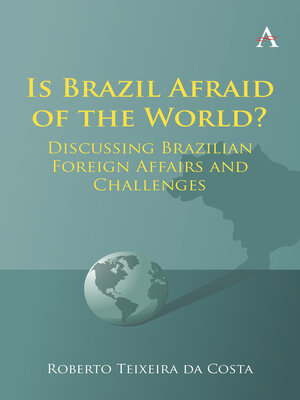Is Brazil Afraid of the World?
ebook ∣ Discussing Brazilian Foreign Affairs and Challenges · Anthem Brazilian Studies
By Roberto Teixeira da Costa

Sign up to save your library
With an OverDrive account, you can save your favorite libraries for at-a-glance information about availability. Find out more about OverDrive accounts.
Find this title in Libby, the library reading app by OverDrive.



Search for a digital library with this title
Title found at these libraries:
| Library Name | Distance |
|---|---|
| Loading... |
What do you think when someone mentions "Brazil"? Probably the first ideas that come to your mind are samba and football. Maybe you think of Pelé, Neymar, Ayrton Senna and Giselle Bundchen. Maybe you think of the rainforest and Rio. But have you ever thought Brazil to be a country afraid of becoming more international? Written by a Brazilian expert in foreign affairs, this book describes Brazilian position in the international scenario and presents an authentic and provocative point of view on the Brazilian international relations. You will read a little about football and samba, but you will also be presented to a comprehensive set of themes, such as the impact of COVID-19, regional agreements, bilateral relations, finances and migration.
|The book offers an overview of Brazil's internationalization process, in particular since the 1950s, accompanying the author's professional trajectory that includes a deep involvement in business diplomacy and the expansion of international investment in Brazil and by Brazilians abroad. Stating that Brazil historically and culturally tends toward isolationism, Roberto Teixeira da Costa develops a hypothesis about what is behind this attitude.
The book continues to focus on the economy, particularly in international trade and business diplomacy, with chapters that discuss industrialization, China and US relations with Brazil, and an excellent provocative analysis about Mercosur, enriched by the author's direct experience in development initiatives in the American continent and in Latin America particularly. The third part that follows discusses international investment and retraces Brazil's historical resistance to engaging in investment abroad, as well as its slow process of developing structural assurances for foreign investment. The author discusses the importance of trust in international relations, even before the institutional assurances necessary for longstanding international cooperation with Brazil. These two parts combined are the "plat de substance", the main course offered by this book.
Roberto Teixeira da Costa tells in the introduction of the book how the writing process started in 2018 and had to be reimagined when the world was hit by the Covid-19 pandemic. After publishing in Brazil, with the Ukrainian invasion by Russia in 2022, another chapter had to be added. The changes in the book, compared to the changes in the world, offer a stimulating parallel. Human society as we know it is being re-written.
The personal and positive attitude of this book is inspiring, reading the past with an eye for opportunities in the present. It is critical towards the lack of engagement of the elite and the political leadership in taking the lead to coordinate efforts around the development of a long-term state strategy for internationalization, but it advocates for this cause with proposals that are achievable with a public-private joint effort. As Brazilians see some of our country's major achievements over the last decades become under siege, Roberto Teixeira da Costa's latest book engages us in a necessary conversation about the importance of building more international cooperation as a vital ingredient to reducing inequalities and promoting social development. A necessary book for a time when Brazil must leave its international isolation to reimagine its identity and role in the planet's future.







